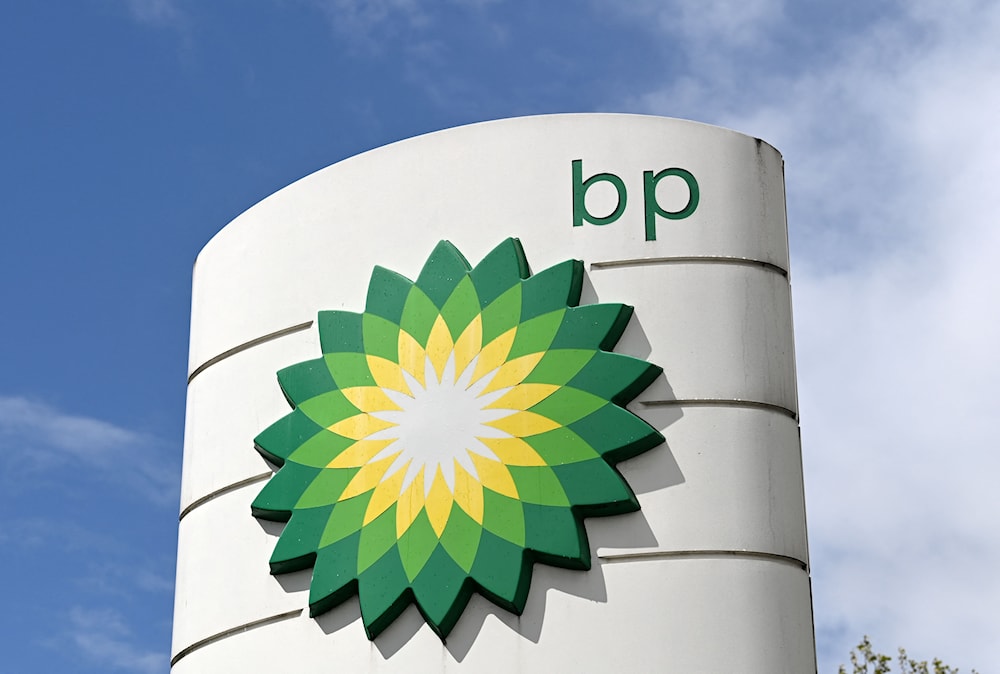UAE eyed taking over British oil giant BP; later ditched plans
Reuters reports that Abu Dhabi's state-owned oil company Adnoc decided against moving forward with the acquisition talks as it deemed the purchase unsuitable.
-

A British Petroleum BP logo as seen in London, UK on May 12, 2021 (AFP)
Abu Dhabi's government-owned oil company is said to have recently considered making a multibillion-pound offer for the UK's British Petroleum BP, The Guardian said in a Friday report, pointing out that this indicates that Britain's struggling economy has put even the country's largest companies a target for foreign acquisition.
Buying out the oil giant or major shares were options explored by the Abu Dhabi National Oil Company (Adnoc), with direct talks being held between both firms. But Adnoc ultimately decided against it and exited initial talks after deeming the purchase unsuitable, Reuters reported.
Shares in BP rose by more than 2% in early trading to £530.5, valuing the company at £89.4 billion.
Read more: BP made billions from British invasion of Iraq: Declassified UK
The recently revealed takeover discussions emerged shortly after BP's CEO, Murray Auchincloss, had to play down rumors about the company being a potential target for acquisition. This happened following the release of quarterly profits in October that were lower than anticipated.
The future of BP became uncertain due to several factors. First, there were a series of large mergers in the US oil industry, which likely raised questions about BP's competitive position and strategic direction. Additionally, the unexpected departure of the company's CEO, Bernard Looney, in early September added to the uncertainty, as it left BP without clear leadership at a critical time.
Read more: Saudi Arabia bleeding funds for Vision 2030: Broken economic model
Auchincloss previously showed optimism regarding takeover rumors, pointing out that BP's trading multiples were similar to those of European oil giants Shell and Total. He also stated that BP had started to reduce the valuation difference with its US competitors.
The British oil firm has lagged behind its competitors in recent years, a performance that investors and analysts attribute to the company's prominent environmental commitments, including a pledge to reduce oil and gas production by 40% by the end of the decade.
However, the company revised this target last year to a 25% reduction after reporting significant profits from oil and gas following the war in Ukraine.
Read more: UK ups family visa requirements in new anti-immigration law
BP and Adnoc have several joint ventures, including a partnership to develop gas assets in Egypt and a deal to acquire a 50% stake in the Israeli natural gas group NewMed, which is currently on hold. BP has had ties with the UAE for over 50 years, dating back to before Adnoc was founded. BP was part of a consortium that explored oil and gas in the Middle East and discovered oil in the emirate in 1958. In recent years, BP has acquired 10% shareholdings in Adnoc's onshore, liquefied natural gas, and gas shipping subsidiaries.
Shell's CEO, Wael Sawan, and former CEO Ben van Beurden have hinted at the possibility of the company listing on the New York Stock Exchange, indicating that US investors are more favorable toward fossil fuels.
Reuters stated that political factors influenced Adnoc's choice to not proceed with a takeover. The UK government can intervene in acquisitions in sectors like energy due to the National Security and Investment Act, which took effect in 2022.
Read more: UK slashes UAE's hopes of acquiring The Telegraph

 4 Min Read
4 Min Read








